The Media in a Divided America
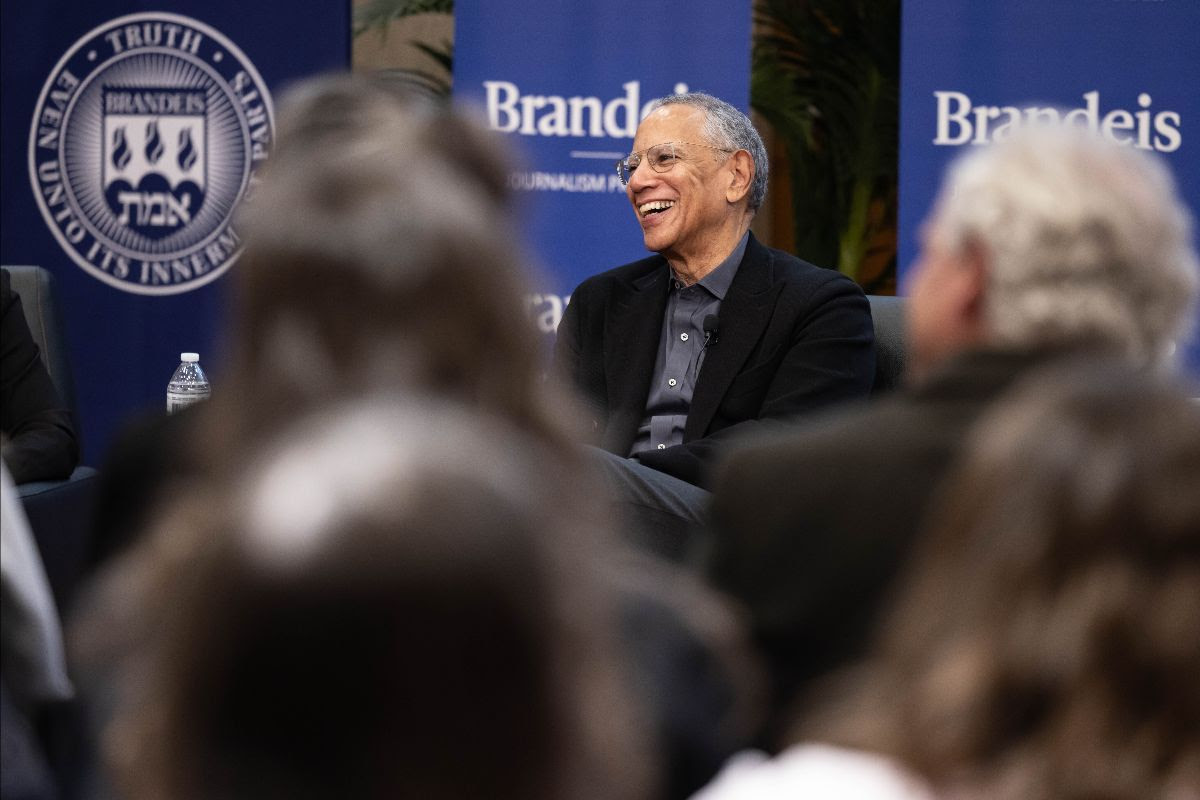 Dean Baquet speaks in Rapaporte Treasure Hall as part of the Elaine Wong Distinguished Lecture Series. Photo by Khimaya Bagla.
Dean Baquet speaks in Rapaporte Treasure Hall as part of the Elaine Wong Distinguished Lecture Series. Photo by Khimaya Bagla.
Dean Baquet, former top editor of The New York Times, visited Brandeis University as a guest of the Journalism Program. Speaking to two full houses on March 4, Baquet joined two forums about polarization in the country as part of the fourth annual Elaine Wong Distinguished Lecture Series. The following day, Baquet offered advice and answered questions at an off-the-record discussion with Journalism students.
Session 1: The Role of the Media in Shaping Polarization
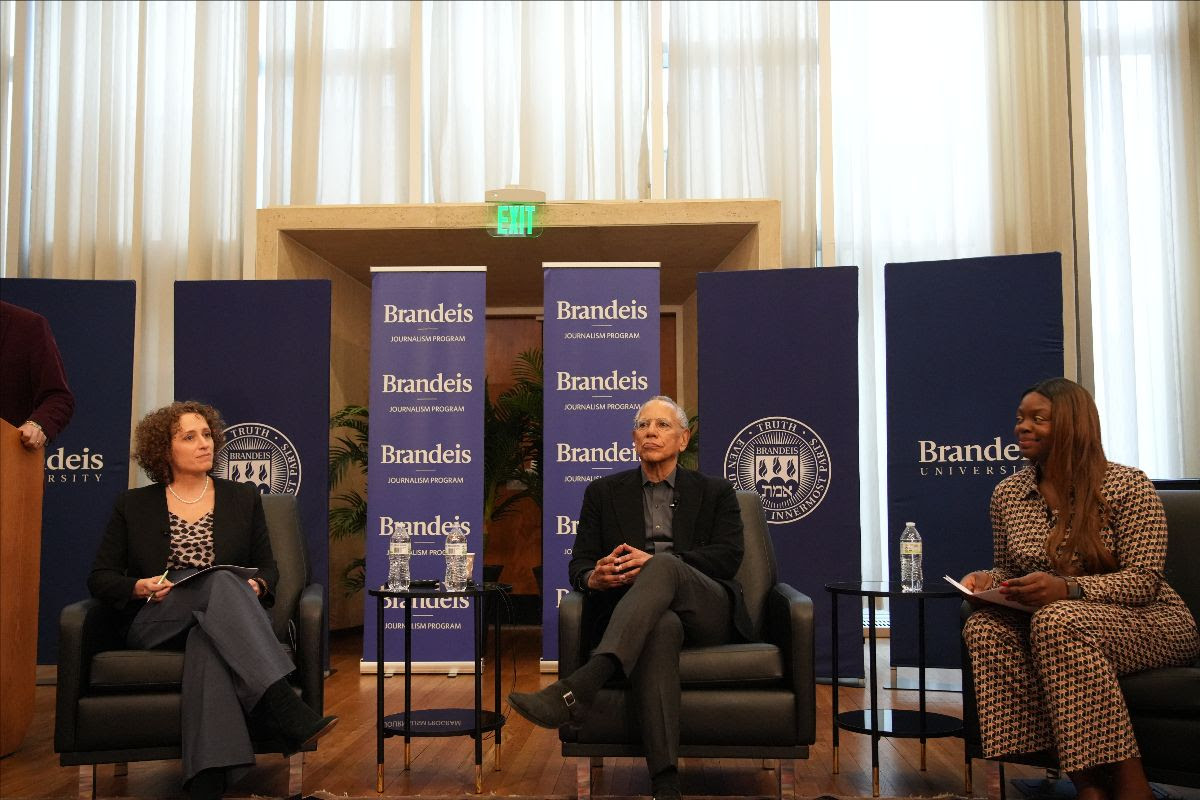 Dean Baquet with Journalism Professors Ann Silvio (left) and Adriana Lacy before the first session. Photo by Khimaya Bagla.
Dean Baquet with Journalism Professors Ann Silvio (left) and Adriana Lacy before the first session. Photo by Khimaya Bagla.
“It used to be: We published a story, and we didn’t tell you how we did the story,” Dean Baquet, former executive editor of The New York Times, told a crowd at Brandeis. Now, reporters are plucked from the byline and placed in front of the readers, he said.
The event featured an insightful conversation between Baquet and Journalism Professors Ann Silvio and Adriana Lacy about the current struggles facing journalism and the changes he witnessed throughout his decades-long career at the top of the field. Notable now, he said, is artificial intelligence, which “is going to be just as evolutionary as the internet. We should dive right in, learn everything we can about it, and seize it, and not pretend that it’s some evil thing lurking.”
Baquet also focused on journalism’s role in democracy, especially amid the polarization facing the country. Baquet expressed concerns about the recent changes at The Washington Post, where owner Jeff Bezos limited the range of opinions the newspaper will publish. Baquet argued that such shifts could narrow public discourse.
“If the Post does not invite opposing views on a whole range of subjects, it's squandering a moment to be one of the leaders of a discussion that the country really needs to have now,” Baquet said.
As the Trump administration continues to criticize mainstream media, both legal and in the court of public opinion, Baquet pointed to specific current events as important leverage points regarding the future of journalism. Specifically, Baquet noted that Trump's lawsuit against CBS News' 60 Minutes' for allegedly manipulating an interview with then Vice President Kamala Harris prior to last year's election has potentially disastrous implications for the integrity of journalism. During Trump's first term, the political playbook changed but coverage by The New York Times didn't change with it.
“We would say we stand with our stories. That’s not good enough anymore,” he said. “If I had to do it over again, when [Trump] started attacking specific stories, I would have set up a way to defend them.”
Despite a plethora of tough stories reported by the Times, Trump maintained significant support from a large portion of the electorate in 2024. His popularity illustrated the challenge of balancing truthful reporting with the deep divides that characterize contemporary politics. Overall, Baquet believes the press did a very good job in its coverage, but he has some general advice for them.
“The thing we can do that no one else can is report,” Baquet said. “Reporting has to be our central craft and that has to dominate our coverage of Trump. The main thing we need to do is stick to our principles and not bend them in an effort to defeat Trump, or to win support from our readers. Hold on to your soul and make the kinds of changes necessary to reach a wider audience.”
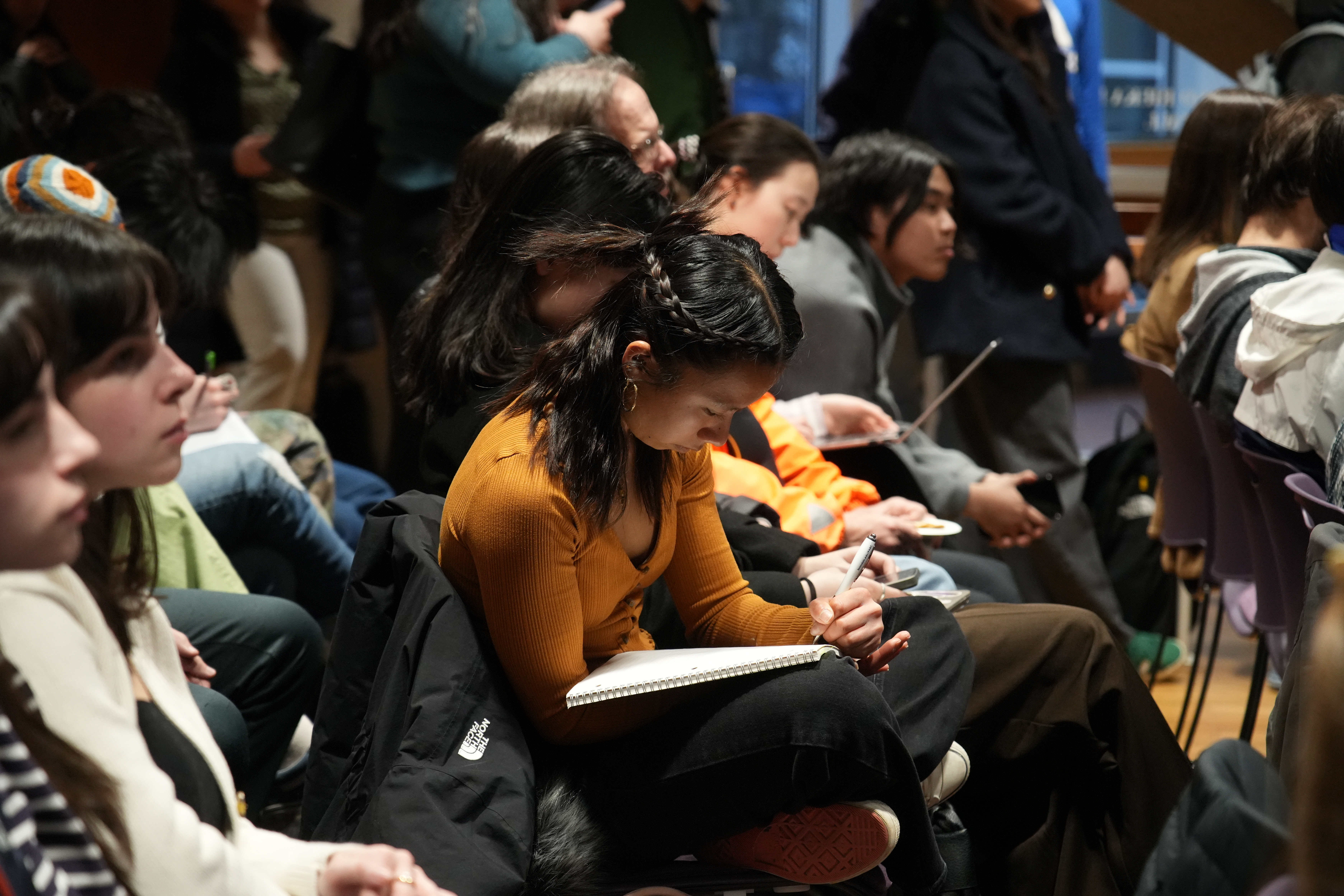 Journalism student Hedy Yang takes notes during the session. Photo by Khimaya Bagla.
Journalism student Hedy Yang takes notes during the session. Photo by Khimaya Bagla.
Baquet, who currently heads the Local Investigations Fellowship at the Times, shared that it wasn’t until after his time as Executive Editor ended that he fully grasped the depth of the crisis facing local newsrooms. He emphasized that local news outlets are essential for holding local governments accountable, but many are struggling with slashed budgets and shrinking staff. Without adequate funding, he argued, these newsrooms will continue to face difficulties and be defenseless against frivolous lawsuits, which can hinder important reporting.
“A journalistic discussion is, 'should we conduct this investigation because it is fair and it is important to our community.' It is not a journalistic discussion to say, ‘let's not do that one because we might get sued,’” he said.
Baquet ended the lecture by encouraging aspiring journalists to remain committed to the fundamental principles of the profession and to be as broadly educated as possible. He said that it is important to “study things that have nothing to do with journalism because everything has to do with journalism.”
“Being a good journalist means being open-minded, willing to learn, and above all, seeking the truth,” he said.
Session 2: The Roots and Evolution of Polarization
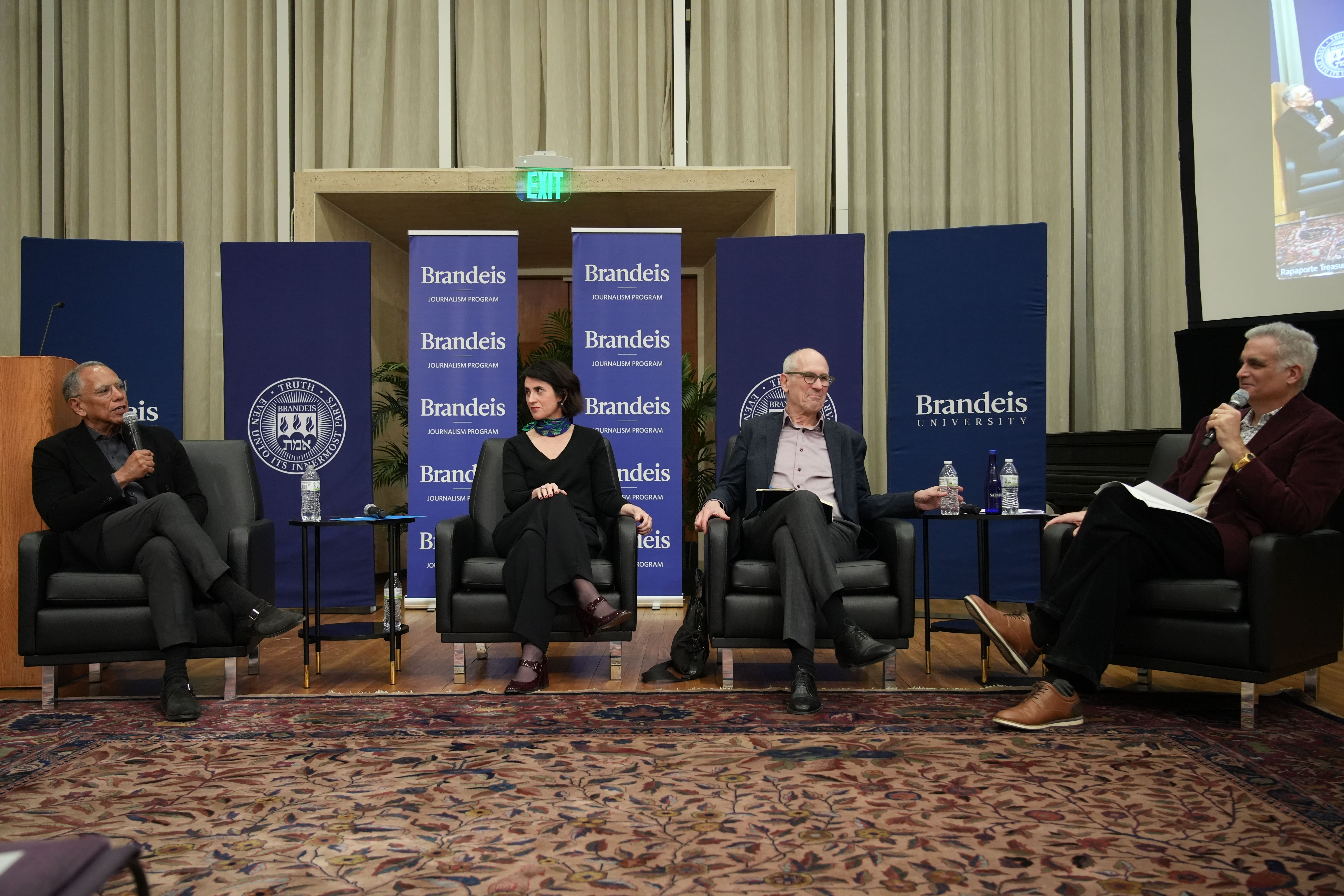 Professor Neil Swidey moderated the conversation between Dean Baquet, Sarah Sobieraj, and Gary Gerstle. Photo by Khimaya Bagla.
Professor Neil Swidey moderated the conversation between Dean Baquet, Sarah Sobieraj, and Gary Gerstle. Photo by Khimaya Bagla.
Later on March 4, University of Cambridge historian Gary Gerstle and Tufts University sociologist Sarah Sobieraj joined Dean Baquet for in a interdisciplinary discussion about the history of division in America and the forces siloing Americans into different realities.
Brandeis Journalism Director Neil Swidey kicked off the panel with a call for context.
Gerstle, who is also the author of The Rise and Fall of the Neoliberal Order, pointed to two key turning points that created a society overwhelmed by cultural polarization. The first involved the repeal of the Fairness Doctrine — which required broadcasters to present multiple viewpoint — under the Reagan administration in 1987. Then, nine years later, the Telecommunications Act — which enabled the unchecked growth of the internet and increased competition — entered onto the scene.
"I want to ask you not simply to focus on the culture wars, but to look at the political economy that lies beneath," Gerstle said. "Because if we don't ... we are going to have an incomplete picture of how to forge a better future."
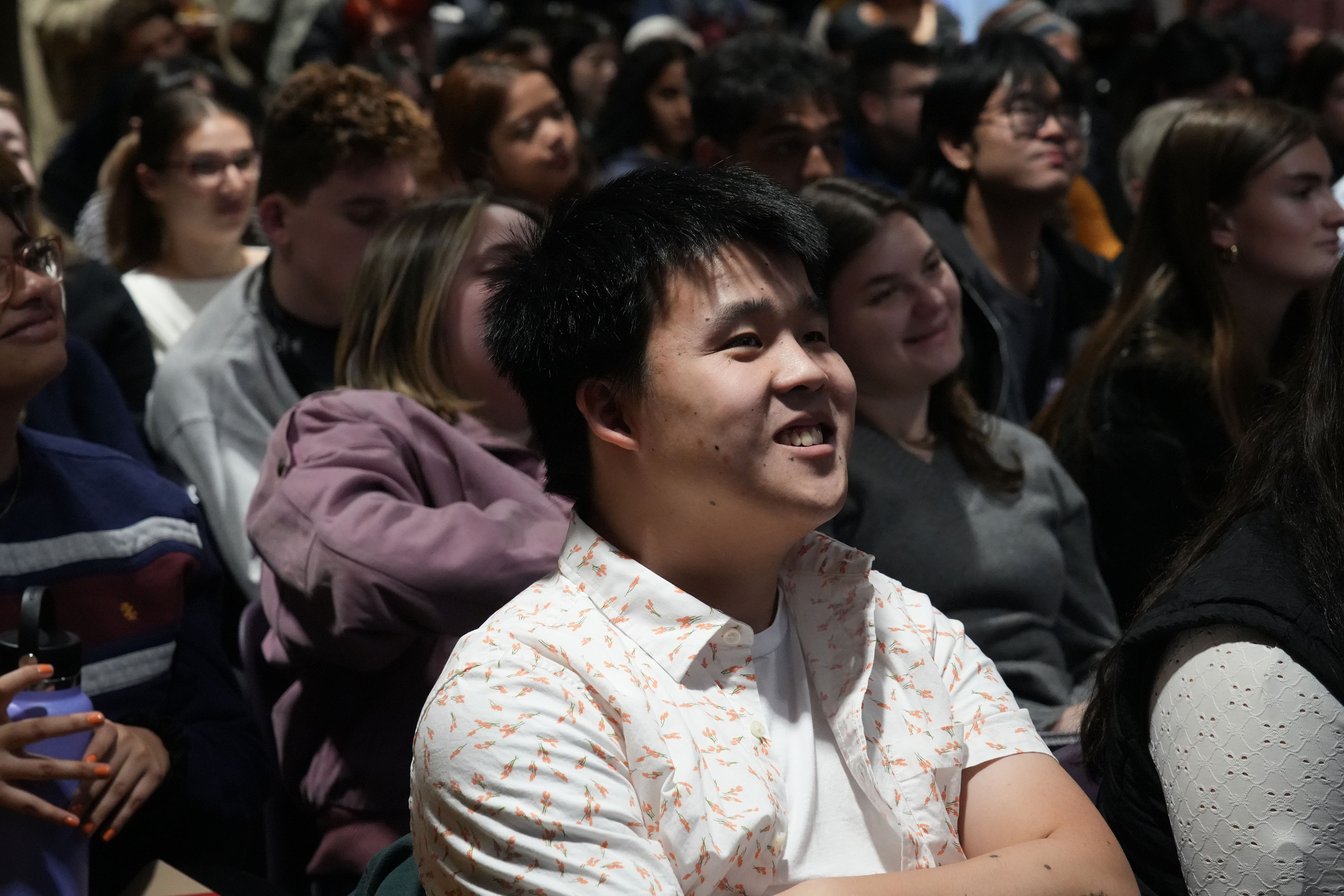 Journalism student Lin Lin Hutchinson watched Dean Baquet speak about the role of media in polarized times. Photo by Khimaya Bagla.
Journalism student Lin Lin Hutchinson watched Dean Baquet speak about the role of media in polarized times. Photo by Khimaya Bagla.
Baquet, who currently heads the Local Investigations Fellowship at the Times, shared that it wasn’t until after his time as Executive Editor ended that he fully grasped the depth of the crisis facing local newsrooms. He emphasized that local news outlets are essential for holding local governments accountable, but many are struggling with slashed budgets and shrinking staff. Without adequate funding, he argued, these newsrooms will continue to face difficulties and be defenseless against frivolous lawsuits, which can hinder important reporting.
“A journalistic discussion is, 'should we conduct this investigation because it is fair and it is important to our community.' It is not a journalistic discussion to say, ‘let's not do that one because we might get sued,’” he said.
Baquet ended the lecture by encouraging aspiring journalists to remain committed to the fundamental principles of the profession and to be as broadly educated as possible. He said that it is important to “study things that have nothing to do with journalism because everything has to do with journalism.”
“Being a good journalist means being open-minded, willing to learn, and above all, seeking the truth,” he said.
Sobieraj, who is also the author of Credible Threat, added another layer to the conversation. She focused on how the structure of modern media contributes to political polarization. Sobieraj emphasized the impact of short-form video platforms like TikTok and Instagram, which use algorithms designed to push personalized content that reinforces viewers' pre-existing beliefs. In this environment, Sobieraj argued, social media becomes a breeding ground for polarization, where individuals are trapped in ideologically selective bubbles rather than being exposed to a range of perspectives. Many social media creators are financially incentivized to produce emotional content, she said.
"And one way they do this is by telling us that the other team is inept, dangerous, deceitful, malfeasant, not just wrong, but actually out to harm us," Sobieraj said.
Baquet knows this reality all too well. When he first became editor, he encouraged his newsroom to get on social media. That soon changed when he realized how fraught those platforms can be. Too often, journalists got into fights online.
"One of the last things I did as a favor to my successor," he said, "was to encourage everybody to get off of social media."
Baquet also acknowledged the need for historical context in both understanding the current political moment and producing journalistically sound work. He emphasized the heavy responsibility placed on journalists in such a polarized climate, explaining that this era demands courageous journalism. Media outlets need to maintain independence from their readers, listeners, and viewers. Baquet pointed to the late Gene Patterson, former editor at the Atlanta Journal Constitution, as a model of radically independent journalism.
“[Patterson] would write front page editorials like after the church bombing … criticizing his readers,” Baquet said. “Sometimes you have to say things to your readers that they don’t necessarily want to hear.”
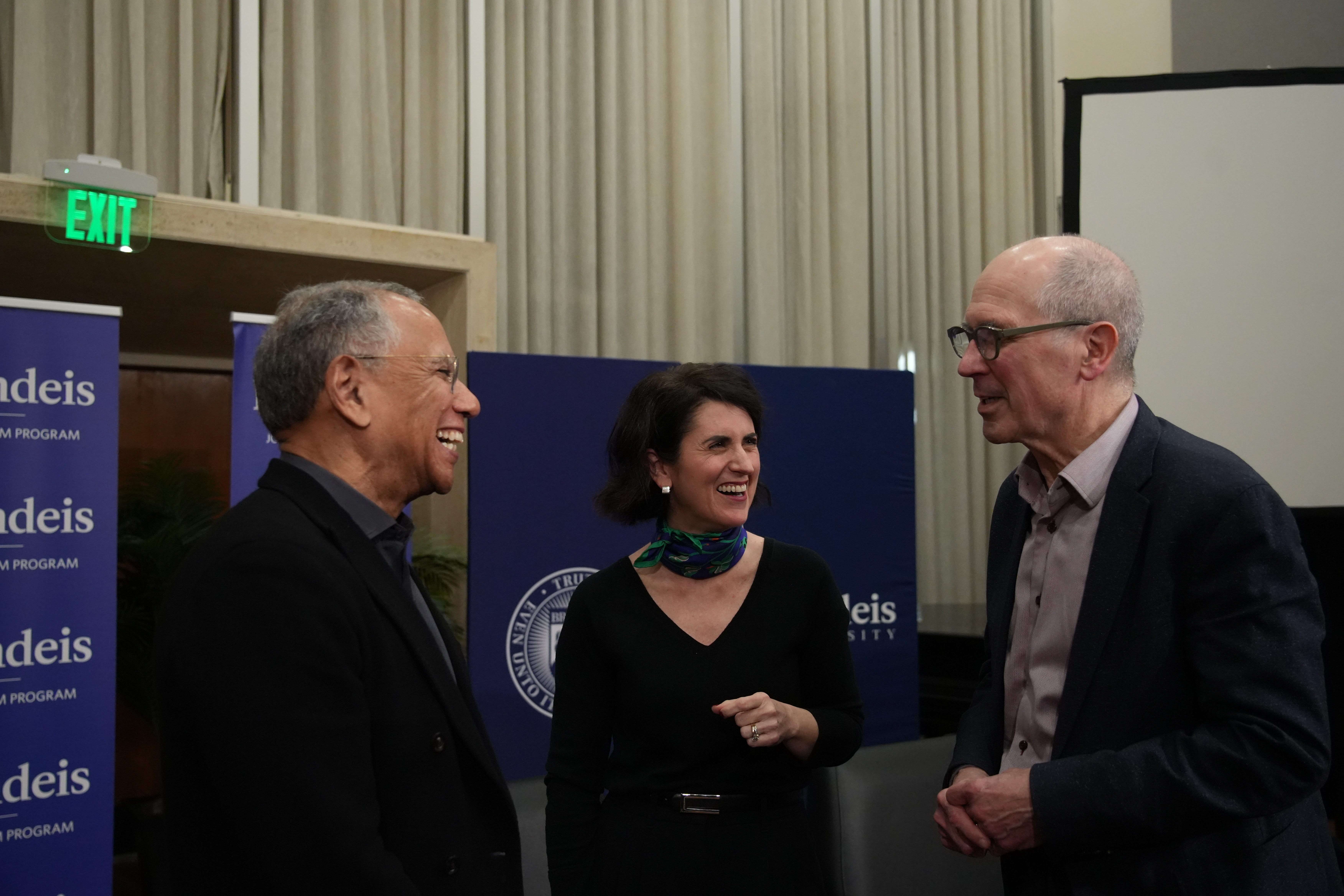 Dean Baquet, Sarah Sobieraj, and Gary Gerstle speak prior to the event. Photo by Khimaya Bagla.
Dean Baquet, Sarah Sobieraj, and Gary Gerstle speak prior to the event. Photo by Khimaya Bagla.
The panelists also narrowed in on coverage of the explosive Feb. 28 White House meeting between President Donald Trump and Ukranian President Volodymyr Zelenskyy. Baquet was impressed by the Times' coverage, especially in the live feeds — which he called, "the elegance of modern journalism."
Gerstle was less blown away. He asked reporters to do more digging to find out whether Zelenskyy knew what was going to happen prior to the meeting.
When discussing such high-stakes, complex stories, Baquet said that the role of major news outlets is to “figure out how best to cover difficult stories,” setting the standard for smaller publications to follow. He cited his decision to use the word "lie" in reference to a statement made by Trump — making the Times the first major news outlet to do so. While he felt confident using the term in this instance, he acknowledged concerns about setting a dangerous precedent.
“I wasn’t anxious about using the word that one time — it was right.” Baquet said. “However, I was anxious about opening up the floodgates, with the word appearing more generally every time a public figure made a mistake.”
Baquet's tenure at the Times spanned some of the most tumultuous periods in recent American history. Under his leadership, the newsroom covered critical events such as the first Trump presidency, the #MeToo movement, Black Lives Matter protests, and the January 6th Capitol attack.
Baquet said that navigating such an era required him to “lean on reporting and to have empathy for staff and story participants,” acknowledging that “most subjects and debates in America are really complicated and have multiple sides.”
The role of journalism is clear, Baquet said: “to surface those complications and ensure people understand the complexities of these discussions.” By doing so, journalists present the full scope of a story, fostering a deeper and more nuanced understanding of current issues.
For more on these events, see Brandeis Stories. The Elaine Wong Distinguished Lecture Program is sponsored by the Office of the Dean of Arts & Sciences. Additional support this year is provided by the Journalism Program and Department of Sociology.